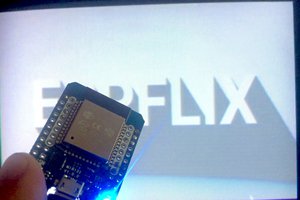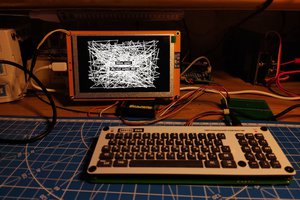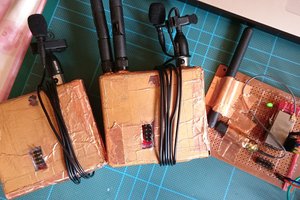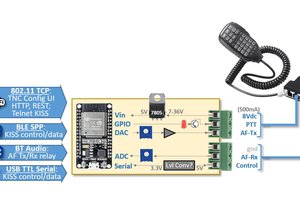ESP_8_BIT is designed to run on the ESP32 within the Arduino IDE framework. Schematic is pretty simple:
-----------
| |
| 25 |------------------> video out
| |
| 18 |---/\/\/\/----|---> audio out
| | 1k |
| | ---
| ESP32 | --- 10nf
| | |
| | v gnd
| |
| | 3.3v <--+-+ IR Receiver
| | gnd <--| ) TSOP4838 etc.
| 0 |-------------+-+ (Optional)
-----------
Before you compile the sketch you have 2 choices:
// Choose one of the video standards: PAL, NTSC #define VIDEO_STANDARD NTSC // Choose one of the following emulators: EMU_NES,EMU_SMS, EMU_ATARI #define EMULATOR EMU_ATARI
Build and run the sketch and connect to an old-timey composite input. The first time the sketch runs in will auto-populate the file system with a selection of fine old and new homebrew games and demos. This process only happens once and takes about ~20 seconds so don't be frightened by the black screen.
The Emulated
Atari 400/800, XL, XEGS, 5200
Oh how I adore thee Atari 8 bit. 40 years on your cheery blue default background color and enigmatically wiggly built-in font still delights me. Your bizarre industrial design and giant floppy drives are the stuff of legend. Nice to see you back in this new incarnation.
Atari support is built from the venerable Atari800 emulator. Some violence was done to move structures and tables into read-only flash. It does not support machines with 128k RAM.
Enter/Exit GUI with F1. In GUI, '1' or '2' keys insert a disk (.atr file) into drives 1 or 2. A '0' key ejects the disk. Shift + Enter will insert Basic along with the selected disk. A 'filename.cfg' file can be used to override default settings. i.e.
miner2049er.bin.cfg (for miner2049er.bin) would look like
-5200 -ntsc -cart-type 4 -cart
File system is mounted as the "H1" device. See https://atari800.github.io/ for more details.
| Keyboard | Atari |
|---|---|
| Arrow Keys | Joystick 1 |
| Left Shift | Fire Button |
| F1 | Open/Close GUI |
| F2 | Option |
| F3 | Select |
| F4 | Start |
| F5 | Warm Reset |
| Shift+F5 | Cold Reset |
| F6 | Help (XL/XE) |
| F7 | Break |
| Keyboard | Atari 5200 |
|---|---|
| S Key | Start |
| P Key | Pause |
| R Key | Reset |
| WiiMote (sideways) | Atari |
|---|---|
| D-Pad | Joysticks |
| A,B,1,2 | Fire Buttons |
| Home | GUI |
| Minus | Select |
| Plus | Start |
| Plus & Minus Together | Warm Reset |
Nintendo Entertainment System
Based on nofrendo.
| Keyboard | NES |
|---|---|
| Arrow Keys | D-Pad |
| Left Shift | Button A |
| Option | Button B |
| Return | Start |
| Tab | Select |
| WiiMote (sideways) | NES |
|---|---|
| Plus | Start |
| Minus | Select |
| A,1 | Button A |
| B,2 | Button B |
| Plus & Minus Together | Reset |
Sega Master System, Game Gear
Based on smsplus. Plays .sms (Sega Master System) and .gg (Game Gear) ROMs. Game Gear titles look a little funny in the middle of the screen, but Shinobi is still a masterpiece.
This is the same emulator with which the brilliant and prolific SpriteTM first demostrated the power of the ESP31. Jeroen is the person most responsible for making the ESP32 ecosystem a pleasure to work with.
| Keyboard | SMS |
|---|---|
| Arrow Keys | D-Pad |
| Left Shift | Button 1 |
| Option | Button 2 |
| Return | Start |
| Tab | Select |
| WiiMote (sideways) | SMS |
|---|---|
| A,1 | Button 1 |
| B,2 | Button 2 |
| Home | GUI |
| Minus | Pause |
| Plus | Start |
| Plus & Minus Together | Reset |
How it works
Composite Video
Much as been written on generating color composite video with microcontrollers. Rickard Gunée kicked it off in 2003, with many fun variants emerging over the years. I enjoyed building the RBox in 2010 that used a Cortex M0 and a R2R DAC to generate color NTSC, then in 2015 the Arduinocade on an Arduino with upgraded crystal that used its SPI port to create the colors. Now that 2020 has given us all a little extra time at home its time to do another one.
Now that we have fancy devices like the ESP8266/ESP32 we can be a little more ambitious. We have an order of magnitude more compute, two orders of magnitude more RAM, and three orders of magnitude more storage than an Arduino. And we have lots of new exotic new peripherals to play...
Read more » rossumur
rossumur



 svofski
svofski
 ben biles
ben biles
 Ryan Kinnett
Ryan Kinnett
I updated to an ESP32 rev 1 and it worked fine - but I could not get it to pair with a Logitech K811 keyboard (the code would explodonate and reboot). No EDR on the K811? What would you recommend for a keyboard or should I just get a Wii remote? This looks like it would be worth the investment! Thanks.